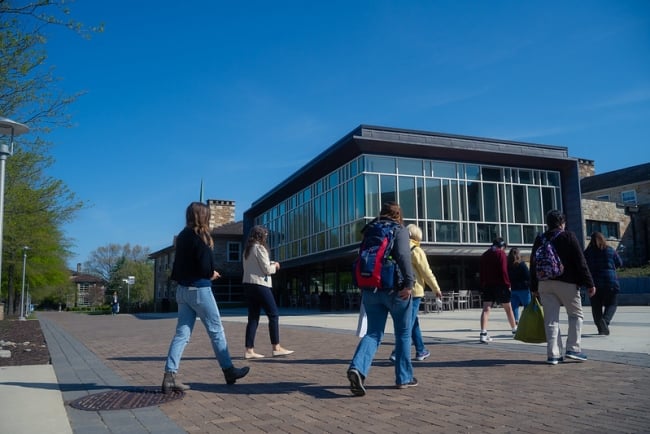You have /5 articles left.
Sign up for a free account or log in.

Students use Goucher College’s micro-internship program for six-week virtual internships hosted by the college’s alumni network.
Flickr/Goucher College
Internships remain important in a student’s career development, but equal access to opportunities remains a challenge.
In 2021, only 21 percent of college students completed an internship, compared to pre-pandemic numbers—50 to 60 percent of students—according to the National Survey of College Internships from University of Wisconsin at Madison’s Center for Research on College-Workforce Transitions.
An August 2022 Student Voice survey conducted by Inside Higher Ed and College Pulse found that first-generation students were likely to lack any internship experience or experiential learning within a course: half of all first-gen students and two-thirds of first-gen community college students had not had these experiences.
Of those studied by the Wisconsin center who did not complete internships, 60 percent said they did not know how to find an internship, 56 percent were burdened with coursework and 40 percent needed to work a paid job instead of interning.
Short-term internships, known as micro-internships, have begun to get attention within higher ed as an effective way to get students that crucial on-the-job experience. At Goucher College in Maryland, officials are putting these opportunities together for undergraduates by tapping into the college’s alumni network.
The inspiration: Goucher started its micro-internships in 2020 following the COVID-19 pandemic and subsequent school closures. Several Goucher students lost their spring and summer 2020 internships, and Julie Elliott, the associate director for Goucher’s Career Education Office, decided to find another solution to help students to get experience.
Building off of Parker Dewey and Swarthmore’s micro-internship models, Elliott partnered with Kristin DeMarco Rickard from Goucher’s alumni relations office to find graduates who would host students for internships during a short-term period.
To start, Goucher piloted the program with its Alumni Association Board, offering 22 students micro-internships during the Fall 2020 semester. This winter, 67 students completed a micro-internship with 49 alumni host organizations.
How it works: During the fall, Goucher alumni submit an internship project proposal. The project must be short-term, remote and ideally provide students with an artifact to take away.
Internships could be anything from running social media accounts to creating digital archives to helping an author edit his book, Elliott explains.
“It’s been really fun to see what projects [are] coming in each year, as the host is just being creative and thinking about how they can support a student and help them to help themselves,” Elliott says.
In November, interested students apply for the micro-internships they want, and the alumni hosts review applications and make their selections. Elliott and the Career Education Office step in to make sure there’s no double dipping in the candidate pool and facilitate introductions between the two parties.
Students provide between 25 and 45 hours of work over Goucher’s winter break and January term, sandwiched between the fall and spring semesters. Depending on the project length, students receive a stipend between $330 and $600.
Payment for students comes at no cost of the host employer, but instead from the college’s Goucher Internship Fellowship fund, which also provides compensation for students with unpaid summer internships.
The need: Elliott’s goal for the program was to give students an experiential learning opportunity without barriers.
By offering the class in January, the internship doesn’t conflict with class schedules. A virtual experience means there’s no concern over the location and in turn housing, transportation or other logistics involved. There’s also less competition, as the program is exclusive to Goucher alumni and students.
“It’s making it easy to get these entry-level internships that will hopefully set them up for longer-term internships or their future paths,” Elliot says.
One piece of the puzzle: Goucher has a four-part Internship Accelerator program that provides career-readiness experiences during a student’s time at the college.
“It’s designed to give students an opportunity to get exposure, to gain experience, to build a professional network, but really understand workplace settings and real-life experience,” Elliott says.
The sequence begins with an employer field trip in a student’s first year, then a micro-internship during sophomore year, a summer or semester-long internship during junior year, and receiving job or graduate school coaching for senior year.
Additionally, a professional academic adviser, or a “success adviser,” partners with each student during their time at Goucher. A study abroad experience is required as well.
Measures of success: To measure the efficiency and engagement of the micro-internships, students take pre-internship and post-internship surveys and complete a reflection document.
Not every micro-internship works perfectly—sometimes students’ availability changes, sometimes the host’s project is no longer needed, sometimes the partnership wasn’t a good fit. Over all, Elliott says, the program has been successful and students report high satisfaction rates.
“I would love to see it grow,” Elliott says. “This year was really great in terms of the numbers, and I think by and large students had really great experiences. So I’m hoping the word of mouth on campus will continue.”
What does your college or university do to track student internship experiences and which demographic groups may need assistance in breaking down barriers to finding or succeeding in internships? Tell us about it.
This article has been updated to correct the spelling of Julie Elliott's name and the timing of Goucher's first pilot program.




